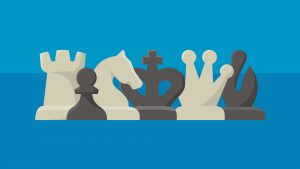
Chess Quiz
Chess is without a doubt one of the most fascinating and popular games in history. Do you know how many moves are possible in chess, or which is the longest chess game?
If you fancy testing your knowledge while learning cool facts about chess, then take the chess quiz below!
If you have a hard time answering any of them, make sure to check the correct answers at the bottom of this page.
1. How many squares does a chessboard have?
- A) 65
- B) 32
- C) 64
- D) 99
2. Who were the opponents in the famous Evergreen Game?
- A) Adolf Anderssen vs. Jean Dufresne
- B) Paul Morphy vs. Howard Staunton
- C) Wilhelm Steinitz vs. Emanuel Lasker
- D) Jose Raul Capablanca vs. Alexander Alekhine
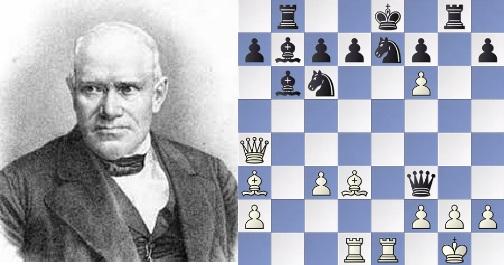
3. How many moves was the longest [known] chess game in history?
- A) 101
- B) 231
- C) 269
- D) 382
4. What is it called when a player can't defend an attack against their king?
- A) Check
- B) Chess
- C) Checkchess
- D) Checkmate
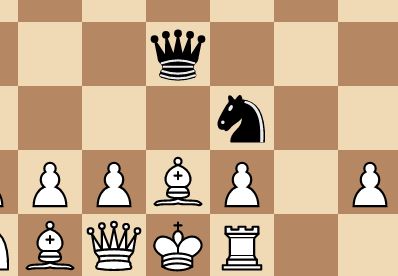
5. The quickest possible checkmate is in:
- A) 2 moves
- B) 1 move
- C) 3 moves
- D) 4 moves
6. Where did chess originate?
- A) India
- B) Russia
- C) Italy
- D) France
7. What does the word “checkmate”/“shah mat” mean in Persian?
- A) King is alone
- B) King is hopeless
- C) King needs help
- D) King is dead
8. Which game is the earliest known predecessor of chess?
- A) Checkers
- B) Ludo
- C) Chaturanga
- D) Go
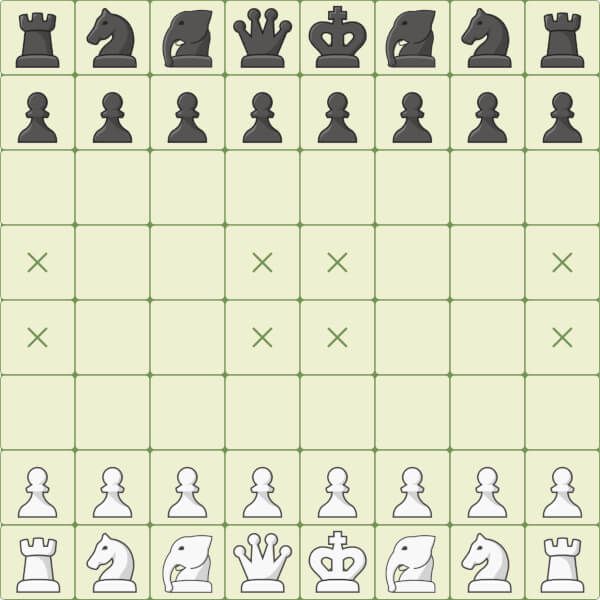
9. Approximately how old is the game of chess?
- A) Around 1500 years
- B) Around 300 years
- C) More than 5000 years
- D) Around 600 years
10. Who was the first official World Chess Champion?
- A) Wilhelm Steinitz
- B) Garry Kasparov
- C) Bobby Fischer
- D) Paul Morphy
11. What is the common abbreviation of the International Chess Federation?
- A) FIA
- B) WCF
- C) IFC
- D) FIDE
12. What is the name of the rating system that measures a player’s strength?
- A) Ela
- B) Elo
- C) Alo
- D) Filo

13. Other than world champion, what is the highest title a chess player can earn?
- A) Super master
- B) Extra master
- C) Grand slam master
- D) Grandmaster
14. What determines which player starts first in a chess game?
- A) Coin flip
- B) Whoever comes first to the board
- C) The player with the black pieces always goes first
- D) The player with the white pieces always goes first
15. The folding chessboard was invented by?
- A) A librarian
- B) A priest
- C) An accountant
- D) A lawyer
16. In 1988 a computer won against a GM for the first time. What was the computer called?
- A) Deep Think
- B) The Super Computer
- C) Deep Thought
- D) Deep Chess
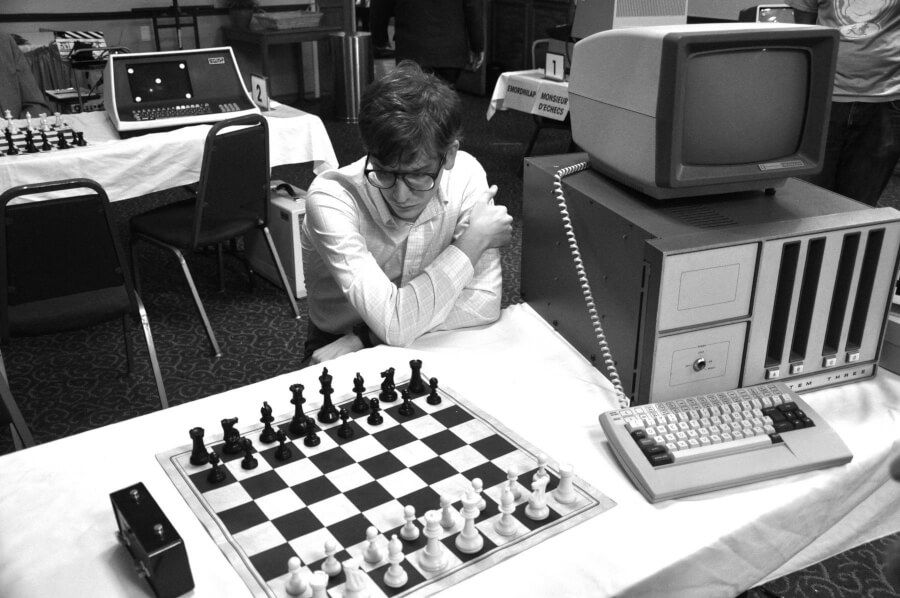
17. If you put one grain of wheat on the first square of the chessboard, then two on the second, four on the third, eight on the fourth, and so on, how many grains of wheat do you need to put on the last 64th square?
- A) 999 999
- B) 1 000 000 001
- C) 64 000 000 000
- D) 9 223 372 036 864 775 808 (approx. 9.22x10^18)
18. How did the first game between Earth and the crew of the Soyuz-9 spacecraft played on the 9th of June, 1970 finish?
- A) White won
- B) Black won
- C) It ended in a draw
- D) It was never finished
19. What is chess played by post or email called?
- A) Long-distance chess
- B) Correspondence chess
- C) Open chess
- D) Interactive chess
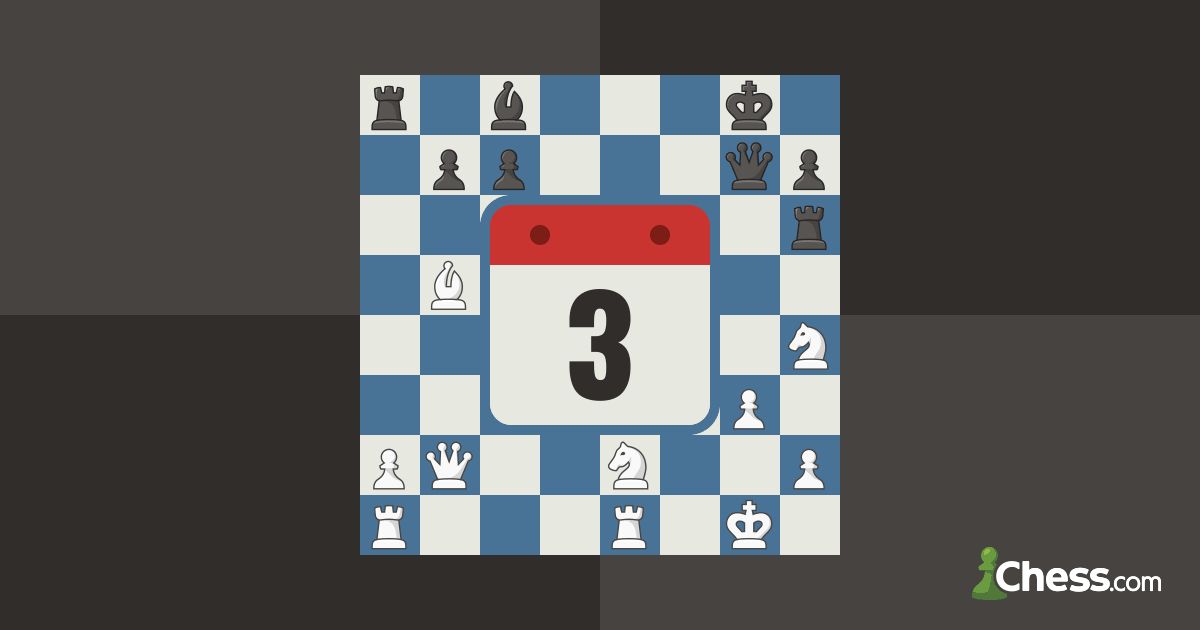
20. Which is the greatest in number?
- A) All atoms in the universe
- B) Possible games of chess
- C) Stars in the Milky Way
- D) People on the planet

Now it’s time to see how many of these you got right! Check out the answers below:
Answers
1. How many squares does a chessboard have? - C. No more, no less. There are eight horizontals (called "files) and eight verticals (called "ranks"), totaling 64 squares.
2. Who were the opponents in the famous Evergreen Game? - A. The Evergreen game is a famous chess game played by Jean Dufresne and Adolf Anderssen in 1852. Anderssen won it by sacrificing multiple pieces and delivering a beautiful checkmate.
3. How many moves was the longest [known] chess game in history? - C. 269 moves! Can you imagine that? The game was played between Ivan Nikolic and Goran Arsovic in Belgrade, 1989. It lasted over 20 hours and ended in a draw.
4. What is it called when a player can't defend an attack against their king? - D. It’s checkmate! Checkmating your opponent is the most crucial goal in the game of chess.
5. The quickest possible checkmate is in - A. Indeed only 2 moves are needed to finish the game in the quickest possible way. This checkmate is also known as the Fool’s mate.
6. Where did chess originate? - A. Historical evidence suggests that chess originated in India.
7. What does the word “checkmate”/“shah mat” mean in Persian? - D. In Persian “shah” stands for “king” and “mat” for “dead,” so there you have it: The king is dead.
8. Which game is the earliest known predecessor of chess? - C. It’s believed to have been invented about 1500 years ago and Chaturanga is the earliest known predecessor of chess.
9. Approximately how old is the game of chess? - A. There is evidence that the earliest predecessor of chess originated nearly 1500 years ago in India and then spread to Persia.
10. Who was the first official World Chess Champion? - A. The 1886 match between Wilhelm Steinitz and Johannes Zukertort was the first official World Chess Championship match. Steinitz won 12.5-7.5 (10 wins, 5 losses, 5 draws) and became the first official world chess champion.
11. What is the common abbreviation of the International Chess Federation? - D. The abbreviation comes from French, and it stands for Federation International des Echecs. Fide was founded in Paris on July 20, 1924.
12. What is the name of the rating system that measures a player’s strength? - B. The system is named after its creator, Arpad Elo. He was a physics professor and also a chess master who worked to improve how the U.S. Chess Federation measured player’s skill levels.
13. Other than world champion, what is the highest title a chess player can earn? - D. The other alternatives are not real chess titles. Grandmaster (abbreviated GM) is a title that players can earn and which they carry for life. The grandmaster title was awarded for the first time in 1950 to 27 players. Since then, the requirements to achieve the highest chess title have changed tremendously.
14. What determines which player starts first in a chess game? - D. The player with the white pieces always starts first.
15. The folding chessboard was invented by? - B. The story tells that a priest came up with the idea that they were forbidden to play chess. The priest then devised a folding board that looked like two books lying together so he could still play the game.
16. In 1988 a computer won against a GM for the first time. What was the computer called? - C. This happened in the American Open, during which the computer won against GM Bent Larsen.
17. If you put one grain of wheat on the first square of the chessboard, then two on the second, four on the third, eight on the fourth, and so on, how many grains of wheat do you need to put on the last 64th square? - D. This is how vast and deep the game of chess is! There are so many combinations of possible moves, which make the game so interesting and unpredictable.
18. How did the first game between Earth and the crew of the Soyuz-9 spacecraft played on the 9th of June, 1970 finish? - C. The game ended peacefully with a draw after 35 moves and about 6 hours. It’s interesting to mention that there was a special board designed for the game and the moves were sent via radio.
19. What is chess played by post or email called? - B. The main difference from regular chess is that the opponents play remotely, and they are not required to play at the same time. This gives more time to make a move, reducing the rate of blunders.
20. Which is the greatest in number? - B. The virtually infinite number of possible chess games is one of the reasons why chess is so interesting and it's still popular today.
Ranking
Add up your points to gauge your chess knowledge! Add five points to every question you got right and check where you stand:
- 0 to 20 points: beginner
- 21 to 40 points: intermediate
- 41 to 60 points: advanced
- 61 to 80 points: expert
- 81-100: chess magician
We hope you enjoyed diving into the chess world through this chess quiz and that it helped you widen your knowledge.
Keep on learning as there are so many interesting chess facts still to be discovered and learned!
